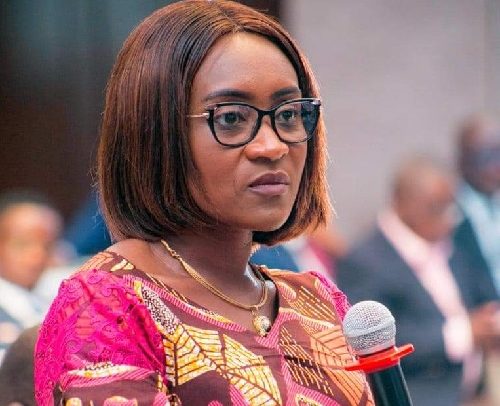Abena Osei Asare
Parliament has rescinded its earlier decision disapproving of the $250 million financing agreement between the government and the International Development Association (IDA) of the World Bank Group.
The motion, moved by the Minister of State at the Ministry of Finance, Abena Osei Asare and seconded by Isaac Adongo, Member of Parliament (MP) for Bolgatanga Central, was approved after a debate, paving the way for the adoption of the Finance Committee’s report on the agreement.
The $250 million financing agreement aims to support Ghana’s Energy Sector Recovery Programme (ESRP), with the aim to reduce the costs of electricity purchases and increase revenue collection of the distribution companies.
It also aims to improve ECG’s financial management system and support the National LPG promotion programme.
However, consideration of the agreement was postponed after Asawase MP, Muntaka Mubarak, revealed that $90 million was intended for consultancy.
Background
Ghana’s energy sector is diverse and includes various sub-sectors such as electricity generation, transmission, distribution, and renewable energy development.
Currently, the country’s electricity generation mix consists of thermal power plants powered primarily by natural gas but also by crude oil, heavy fuel oil, and diesel, as well as renewable energy sources such as hydroelectric power, solar energy, and bioenergy.
The power generation sector has evolved over the years to include players from both the public and private sectors.
According to MPs, reforms implemented in the sector since the 1980s have also helped in transforming the industry by removing barriers and opening the market to Independent Power Producers (IPPs).
A report presented to the House indicated that as at the end of 2023, IPPs accounted for about 2,500 MW of the total 5,640 MW installed generation capacity.
They said the entry of IPPs into the power generation landscape has brought about increased competition, improved efficiency, and expanded capacity in Ghana’s electricity sector.
The MPs noted that all these efforts have enabled the country to make considerable strides in expanding access to electricity. As at 2023, electricity access rate was estimated at 88.85% of the population, one of the highest rates in sub-Saharan Africa.
They observed that despite the overall progress, disparities in electricity access persist between urban and rural areas in Ghana, as is the case in many African countries.
They argued that to address the disparity in electricity access, particularly in rural and underserved areas, the government implemented various initiatives to expand electricity access, such as the National Electrification Scheme, the Rural Electrification Project, and the Renewable Energy Master Plan.
Government has also sourced financial and technical support from its development partners to support the energy infrastructure development, improve access to electricity, enhance energy efficiency, and promote sustainable energy solutions.
The recently closed Ghana Energy Sector Transformation Initiative Project (GESTIP) sought to strengthen the capacity of the energy sector to implement sector reforms, and improve energy sector planning and coordination in Ghana.
The World Bank-financed Development Policy Operation amounting to $900 million also has an energy pillar that focuses on clearing legacy sector arrears; implementing the Cash Waterfall Mechanism; mandating competition for all new generation, and promoting the application of the tariff methodology that includes a glide path towards cost reflectiveness.
Despite the significant investments and reforms implemented by the government and the development partners, challenges such as increase in distribution losses, low collection rate, and below cost recovery tariffs still persist.
These challenges continue to remain a major concern for the government.
The government then implemented the Energy Sector Recovery Programme (ESRP) in 2019 which focused on restoring financial viability of the sector; curtailing further accumulation of sector arrears, and repayment of outstanding sector arrears by 2023.
However, despite some significant successes made under the ESRP, financial equilibrium was not achieved as at the end of 2023.
This has compelled the government to redesign and extend the implementation of the ESRP to December 2025.
By Ernest Kofi Adu, Parliamentary Correspondent


